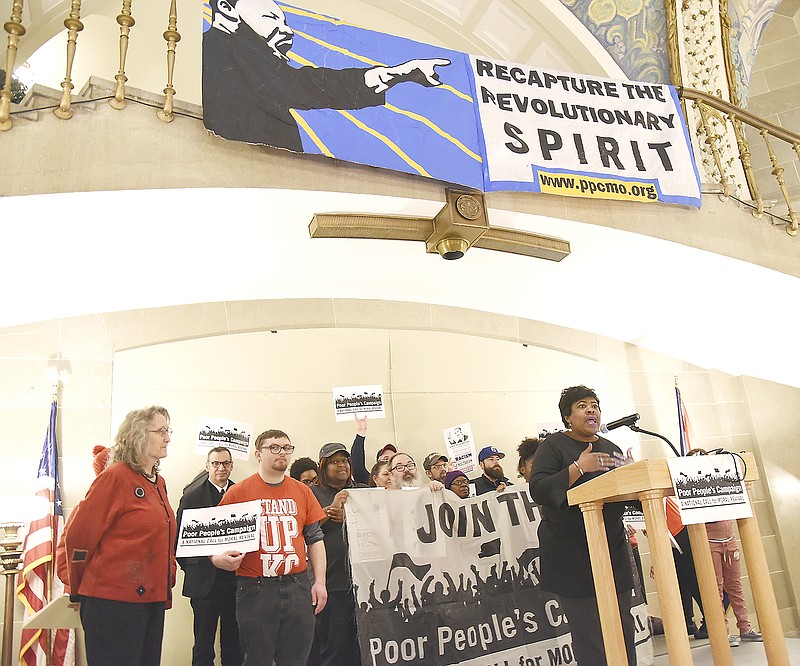Disenfranchised people, low-wage workers, immigration Dreamers, clergy and moral allies gathered Monday morning at the base of the Missouri Capitol Rotunda to kick-start an effort to raise awareness of issues affecting them.
The roots of the "2018 Poor People's Campaign: A National Call for Moral Revival" stem from Martin Luther King Jr.'s launch of the first Poor Campaign 50 years ago.
Organizers of the effort said they and like-minded people in about 30 other states provided letters for governors and lawmakers, encouraging them to reverse trends toward systemic racism, economic inequality and militarism. Speakers called on lawmakers to raise awareness of the devastation ecological disasters have on the state's most vulnerable populations.
The campaign calls on people from every walk of life to join it, said Carol Smith, chairwoman of the Missouri Rural Crisis Center.
Many of the issues King recognized when he started the campaign 50 years ago remain relevant, she said.
"There is much work that needs to be done across the nation," Smith said, "and right here in Missouri.
"What has changed?" she asked listeners.
There has been a 60 percent increase in the number of poor people in the country during the past 50 years, she said. One in every seven people in Missouri faces challenges related to poverty.
In more than half the counties in the state, one in four children live in poverty, she said.
"Work does not ensure that you escape poverty," she told listeners. "Half of workers in America wake up every day making under $15 an hour."
People pay higher percentages of wages for housing than they did in the past.
Furthermore, the stock of affordable housing has fallen, Smith said. All these factors and more add challenges for Missouri's poor.
"Recent Missouri law strikes at the very heart of the historic gains sought by the civil rights movement," Smith said. "Missouri is one of 23 states that adopted a law that undermines and suppresses voter access."
In 2016, Missouri voters passed a measure in 2016 requiring voters to provide government-issued identification, such as a driver's license, passport or military ID at the polls. Others can use a college ID, utility bill or bank statement showing their name and address and sign a document testifying they are whom they claim to be. Organizations have opposed the law, saying it dissuades poor and minority residents, who tend to be Democrats, from voting.
Smith said it's past time to change the state's course of actions.
Rabbi Doug Alpert, of Kansas City's Urban Jewish Community, encouraged listeners to get involved in opposition to policies that are intended to repress minorities and the poor.
"We're obligated to fight racism and a slave economy in all its insidious forms," Alpert said, "to build a new economy - not built on racial injustice and not built on the backs of people of color and all the working poor."
Burger King employee Bridget Hughes described the difficulties of trying to raise a family, buy groceries and pay rent on $10 an hour. Michelle Tiffany, a working single mother, talked about the struggles of raising three children in Columbia as a home health care worker. Diana Martinez, a Dreamer from Kansas City, discussed her concerns about whether the United States could uphold its "promise of freedom."
Dreamers are recipients of the Deferred Action for Childhood Arrivals - people whose parents brought them into the United States as children. DACA was an executive order issued by President Barack Obama that shielded the children of illegal immigrants from deportation.
The Rev. Cassandra Gould, of Quinn Chapel A.M.E. Church in Jefferson City, said conditions haven't really changed after the deaths of two Memphis sanitation workers more than 50 years ago that so troubled King.
Low-wage workers in Memphis continue to work in dangerous conditions without pensions or retirement plans.
They are not only Memphis issues, but also Missouri issues, Gould said.
"We are in the state Capitol, a place where lawmakers decided that low-wage workers in St. Louis and in Kansas City did not deserve to put food on their tables," she said. "This time, something different will happen."
In 2017, Kansas City and St. Louis voters passed measures to raise local minimum wages to $10 an hour, but Missouri legislators passed a pre-emptive statute that prohibited local governments from raising minimum wages above the state level of $7.70.
Gould said rally attendees were gathered to make certain their children and children's children would not continue to deal with the same kinds of repressive conditions that exist today.
After the event, Gould said the rally was part of a moment in which people could collaborate to create systemic changes.
The Rev. John Bennett said the rally helps people not only remember King's work, but to continue his work and follow in his path. A retired long-time pastor who served for a time in Jefferson City, Bennett was among 23 people arrested in the Capitol on May 6, 2014, while protesting in an effort to get lawmakers to expand Medicaid.
"We've got to keep up the fight," Bennett said. "Every time I'm in this Capitol, I feel the hovering presence of the prophets call out for justice."

